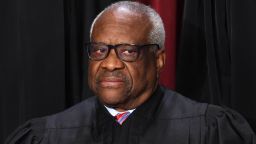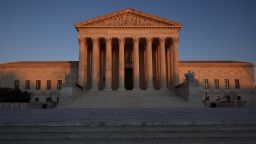Editor’s Note: John Dean, a CNN contributor, is the former White House Counsel for President Nixon and the author of “The Rehnquist Choice: The Untold Story of the Nixon Appointment That Redefined the Supreme Court.” James D. Robenalt is a lawyer and author of “January 1973: Watergate, Roe v Wade, Vietnam, and the Month That Changed America Forever.” Together, Dean and Robenalt teach a continuing legal education program for lawyers called the WatergateCLE. The opinions expressed in this commentary are the writers’ own. View more opinion on CNN.
The shocking disclosures from a recent ProPublica article about Supreme Court Associate Justice Clarence Thomas’s acceptance of lavish gifts from Harlan Crow, a real estate mogul and Republican megadonor, raise the question of when a justice has so compromised his or her integrity — and that of the Supreme Court — that the justice should resign or be impeached.


Though Thomas has indicated he intends to amend his financial disclosure forms to reflect a 2014 real estate deal he made with Crow, that is hardly sufficient. We still need a full airing of Thomas’s acceptance of gifts and expensive vacations paid for by Crow for more than 20 years, as well as a process of accountability.
Thomas has ridden out previous scandals without stepping down, and it seems evident that the Republican-controlled House won’t call for impeachment. So, if the reported facts turn out to be true, the Democrat-led Senate should open a Watergate-style investigation to lay the groundwork for Thomas’s impeachment if warranted.
The public needs to know who benefited from all of Crow’s largesse. For instance, did any relevant cases reach the court during this time and, if so, how did Thomas vote? Exactly how much was spent for Thomas’s vacations and what monies were tendered to buy and fix up his family’s real estate? Who gained access to Thomas on these vacations? Given the lack of a code of conduct for Supreme Court justices, a congressional investigation is sorely needed.
We think the Nixon presidency has lessons for how to address the present-day ethical chaos that Thomas has created for himself and the Supreme Court. The closest analogue to Thomas’s situation — the discovery of financial improprieties that resulted in Associate Justice Abe Fortas’s resignation from the Supreme Court in 1969 — took place during the first year of the Nixon administration.
When Chief Justice Earl Warren, a longtime Nixon nemesis, announced in June 1968 that he intended to step down, then-President Lyndon B. Johnson tapped Fortas, who became an associate justice in 1965, for elevation to the chief’s seat.
But LBJ was already a lame duck then, so Senate Republicans, at the prompting of Nixon’s campaign, filibustered the Fortas nomination to give Nixon the opportunity to choose a chief justice in the event that he won.
The nomination was no doubt influenced by anti-Semitism (Fortas would have been the first Jewish chief justice) and the senators criticized Fortas’s permissive (for the era) rulings in pornography cases as well as his continuing consultations with Johnson, an old friend, after he was placed on the court in 1965.
But most damning attack was the money Fortas had accepted to teach at the American University. The funds were provided by former clients of Fortas’s law firm who could eventually have cases before the high court. While justices then and now accept occasional fees for conferences, teaching or books, Fortas’s $15,000 payment, 40% of a Supreme Court justice’s salary at that time, seemed tainted and excessive.
Fortas withdrew his name from consideration to be chief justice. It was then revealed that Fortas had accepted a $20,000 annual retainer from a financier named Louis Wolfson to be on his charitable foundation. Wolfson was under federal investigation for securities fraud and had asked Fortas to intervene on his behalf. Though a report from the time suggests that Fortas never acted on the request, Warren, at that point still chief justice, went to Fortas and told him he should resign. Fortas did so on May 14, 1969.
By historical standards, the sheer scale of the undisclosed gifts, or in-kind donations, to Thomas make the Fortas “honorariums” and “retainer” payments pale in comparison. But Thomas manifests no inclination to resign, his Supreme Court colleagues don’t seem to be demanding it and the GOP has done an about-face on preserving the integrity of the high court. That leaves it to the Senate to open an inquiry, given that the allegations against Thomas have the potential to be as serious as any Fortas faced.
A letter written by Citizens for Responsibility and Ethics in Washington (CREW), co-authored by former chief White House ethics counsels for Presidents George W. Bush and Barack Obama, suggests that if the ProPublica reports are true, Thomas has engaged in a course of conduct that could result in a civil action filed by the attorney general and even criminal sanctions.
The scale of the Thomas revelations are truly breathtaking. For two decades, the justice accepted gifts without reporting them from billionaire Harlan Crow, a man Thomas met after he had been elevated to the Supreme Court, according to ProPublica. Crow regularly hosted Thomas, and at times his spouse Ginni, on extravagant vacations. In addition, Crow purchased and renovated properties from Thomas, including the home where Thomas’ mother still lives.
The vacations were occasions for powerful conservatives and Republican leaders to rub elbows with Thomas. One painting at Crow’s 105-acre Adirondack resort makes the connection clear, with Thomas seated next to Crow, the Federalist Society’s Leonard Leo and Peter Rutledge, a professor of law who has assisted others in filings before the Supreme Court, and Mark Paoletta, who represented Ginni Thomas when she was asked to appear before the House Jan. 6 committee.
On one 2019 vacation, Crow sponsored a nine-day “island hopping” cruise on his superyacht for Thomas and his spouse to Indonesia, including private jet travel to the departure point, that ProPublica estimated would have “exceeded $500,000” in value if chartered by Thomas himself. That was nearly double an associate justice’s annual salary on the court.
Earlier this month, Thomas stated that he didn’t disclose the luxury travel from Crow, among his “dearest friends,” because he was advised he didn’t have to. “Early in my tenure at the Court, I sought guidance from my colleagues and others in the judiciary, and was advised that this sort of personal hospitality from close personal friends, who did not have business before the Court, was not reportable,” he said. As the regulations have recently changed, he added that it was his “intent to follow the guidance in the future.” He has yet to publicly address the real estate deals.
The time for congressional investigation is now. The House is typically where impeachment investigations begin, but the Senate must act where the House won’t. And here is where the Watergate precedent is relevant.
Southern Democrats friendly to Nixon held sway in the House when he was president. It was the Senate that investigated the Watergate break-in and cover-up through the Senate Watergate Committee. They took witness testimony and gathered documents, eventually discovering the secret White House taping system.
Also, it was the Senate that demanded appointment of an independent special prosecutor to investigate Watergate. When the House was finally embarrassed into beginning an impeachment inquiry, it was the work of the Senate Watergate Committee they relied upon.
The Senate must undertake the same effort today given the seriousness of the allegations of Thomas’s wrongdoing.






